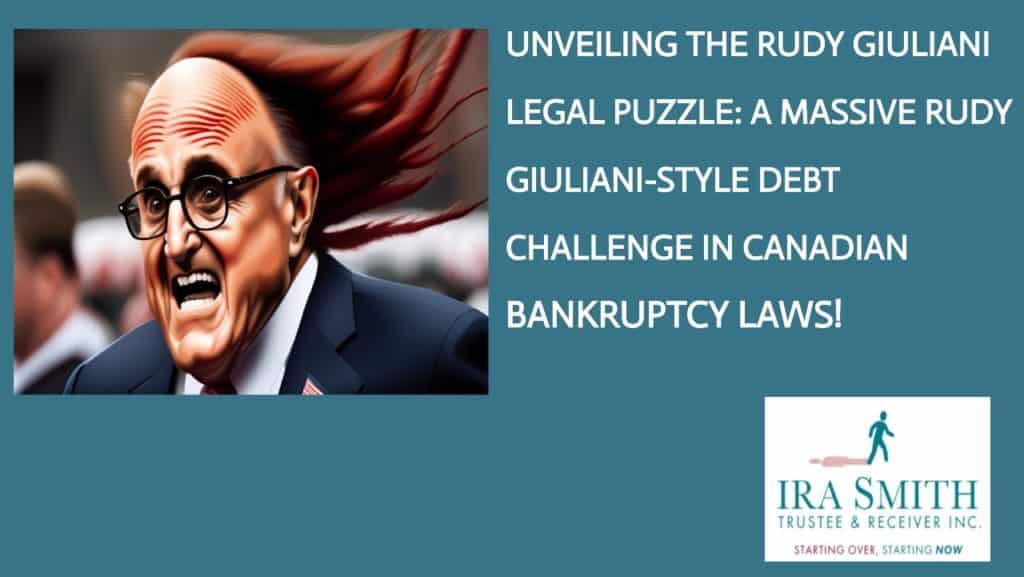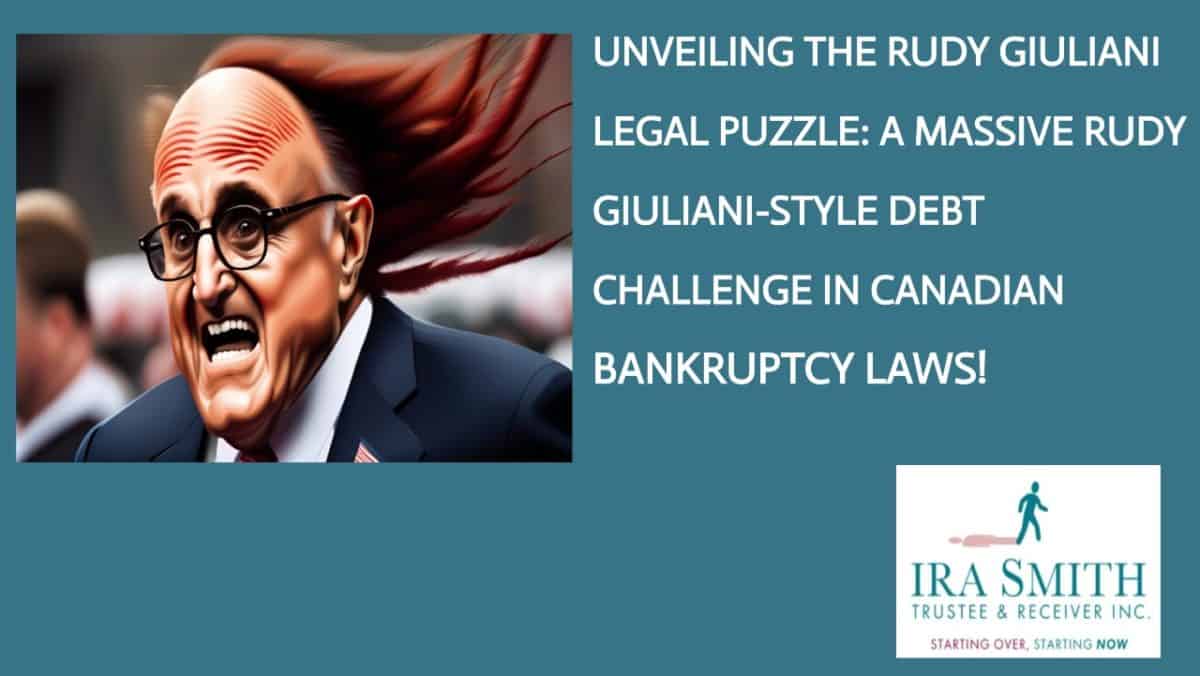Rudy Giuliani: Introduction
Rudolph Giuliani, formerly revered as a prominent figure in American governance for his commendable response during the September 11th attacks, has encountered a series of legal predicaments in recent times. Notably, his entanglement in the Ukraine scandal on behalf of Donald Trump to discredit Hunter Biden and his father Joe Biden, which led to the first impeachment of President Trump. From there, Rudy Giuliani, on behalf of Donald Trump, embraced all the conspiracy theories with his active role in disseminating baseless election claims and election-denier allegations of electoral malpractice during the 2020 Presidential election because of Trump’s election loss. These have significantly marred Giuliani’s once esteemed standing.
Rudy Giuliani’s post-election activities following Donald Trump’s loss in the 2020 election have stirred significant controversy. The actions taken by Giuliani against individuals such as Freeman and Moss have led to legal repercussions and personal ramifications. Understanding the sequence of events provides insight into the aftermath of the false allegations and subsequent legal proceedings.
Now, given the multiple lawsuits and legal challenges, Giuliani has filed for bankruptcy to escape accountability for his actions. However, it is important to note that his US Chapter 11 bankruptcy is not a foolproof method to avoid legal consequences.
In this Brandon’s Blog, I will also look at this from the perspective of what would be the case if Rudy Giuliani was Canadian.
Background on Rudy Giuliani’s legal issues
Rudy Giuliani’s False Allegations
After the contentious 2020 election, 79-year-old Giuliani, a prominent figure in Trump’s legal team, made false claims and damaging statements about two Georgia election workers, Ruby Freeman and Shaye Moss. These unfounded allegations attacked their character and integrity, creating controversy and misinformation. The impact of Giuliani’s words reverberated through the media and public consciousness, tarnishing the reputation and physical safety of Freeman and Moss.
Background on Rudy Giuliani’s legal issues
In response to the baseless claims made by Giuliani, Ruby Freeman and Wandrea’ ArShaye (“Shaye”) Moss took legal action by filing a defamation lawsuit. The lawsuit aimed to hold Giuliani accountable for his reckless statements and the resulting harm caused to their reputation.

After the due legal process in the defamation trial, a default judgment was issued in favour of Freeman and Moss, highlighting the severity of Giuliani’s bad faith actions and the court’s acknowledgment of the harm inflicted. A jury awarded Freeman and Moss over $148M in damages from Rudy Giuliani, including $75M in punitive damages, $33,169,000 in defamation damages, and $40M in total damages for infliction of emotional distress. The defamation lawsuit sought to restore the damaged reputation of Freeman and Moss. The default judgment and jury award underscored the gravity of Giuliani’s false allegations. Legal recourse was instrumental in addressing the defamation and seeking justice for the impacted parties.
Explanation of why Rudy Giuliani filed for bankruptcy
Following the issuance of the default judgment and the jury award in favour of Freeman and Moss, Rudy Giuliani’s legal troubles escalated. Just three days after the final judgment was entered, Giuliani unexpectedly decided to file for Chapter 11 bankruptcy protection.
Giuliani’s bankruptcy filing added another layer of complexity to the already tumultuous legal saga. The decision to file for bankruptcy so soon after the judgment raised eyebrows and sparked speculation about Giuliani’s financial state and made many suspect that he was in a state of financial ruin.
The timing of Giuliani’s bankruptcy filing about the legal ruling underscored the interconnected web of consequences resulting from his false allegations. The filing hinted at potential financial repercussions for Giuliani and opened avenues for further examination of his actions.
Definition of bankruptcy protection and how it can help individuals in financial distress

Bankruptcy is a legal process that allows individuals or businesses to seek relief from their debts and reorganize their finances. While filing for bankruptcy can provide temporary protection from creditors and halt legal actions, it does not erase all obligations or shield individuals from all types of legal liabilities. Bankruptcy allows honest but unfortunate debtors to discharge themselves of their debts in return for surrendering most of their assets to the Trustee.
The Rudy Giuliani Bankruptcy Protection and its Limitations
In Giuliani’s case, bankruptcy may not protect him from lawsuits related to his alleged involvement in various illegal activities. If he is found guilty of misconduct, bankruptcy will not absolve him of criminal or civil penalties. Additionally, bankruptcy courts have the authority to reject deemed abusive or fraudulent filings.
Moreover, Giuliani’s reputation and standing in the legal community, whatever is left of it, may suffer further by his using his Chapter 11 bankruptcy to evade accountability. Ultimately, using bankruptcy as a strategy to escape legal accountability is not a guaranteed solution. Giuliani must face the consequences of his actions and address the legal challenges against him transparently and responsibly. Only by taking accountability for his actions can he begin to rebuild his reputation and credibility in the eyes of the public and the legal system.
The Allegations Against Rudy Giuliani
Giuliani’s purported defamation campaign has garnered widespread attention and scrutiny, leading to a legal showdown that could reshape the contours of US bankruptcy law. The lawsuit argues that the damage inflicted by Giuliani was not incidental but calculated, seeking to tarnish the reputation and livelihood of the plaintiff.
The allegations against Giuliani paint a compelling narrative of deliberate harm and a blatant disregard for the consequences of his actions. Such intentional and malicious conduct, if proven, could have significant ramifications on the dischargeability of debts incurred as a result. In essence, the lawsuit thrusts the spotlight on the intersection of personal liability and financial obligations in a high-stakes legal arena.
A significant legal battle unfolded in the U.S. Bankruptcy Court, revolving around the dischargeability of debt in a high-profile case involving former New York City mayor, Rudy Giuliani. The lawsuit focuses on the implications of Giuliani’s alleged defamation campaign and raises crucial questions about the nature of the debts incurred. Let’s delve deeper into the details of this complex legal dispute.

The core of the lawsuit lies in the determination of whether the debts stemming from Giuliani’s actions are dischargeable under U.S. bankruptcy law. The plaintiff has taken the stance that Giuliani’s defamation campaign was not just a casual misstep but a willful and malicious injury, causing severe harm and repercussions. Giuliani has stated that he intends to appeal the defamation verdict, to get the relief granted to Freeman and Moss substantially lowered.
The Unforgiving Nature of U.S. Bankruptcy Law
Under U.S. bankruptcy law, debts arising from willful and malicious injuries are subject to special treatment, reflecting the seriousness with which such actions are viewed. The rationale behind this provision is to prevent wrongdoers from evading accountability through the shelter of bankruptcy, ensuring that victims are not deprived of recourse and justice.
Debts stemming from intentional torts, such as defamation, fall within this category of nondischargeable obligations, highlighting the stringent standards applied in such cases. The law recognizes the inherent harm caused by deliberate misconduct and aims to uphold the principles of fairness and justice in the realm of debt resolution.
The lawsuit represents a crucial juncture in the legal landscape, setting a precedent for similar cases in the future. It underscores the importance of accountability and responsibility in the realm of public statements and actions. The outcome of this case could have far-reaching implications for how defamation and intentional harm are treated in bankruptcy proceedings.
Giuliani’s debt represents more than a financial obligation; it is a tangible symbol of the repercussions he must bear for his intentional and malicious conduct. The pursuit of non-dischargeability underscores the gravity of his actions and the commitment to holding him answerable for the harm caused. It serves as a potent reminder that accountability transcends monetary concerns, encompassing the broader spectrum of ethical and moral responsibilities.
Rudy Giuliani’s Bankruptcy Implications and Beyond
The outcome of this lawsuit has the potential to shape the legal landscape surrounding the dischargeability of debts in cases involving intentional harm. It raises fundamental questions about the boundaries of free speech, the responsibilities of public figures, and the consequences of malign actions.

As the legal proceedings unfold, the intricacies of the case will be scrutinized, setting a precedent that could reverberate across similar disputes. Ultimately, the lawsuit encapsulates the inherent tension between individual rights and societal interests, underscoring the complexities of balancing personal freedoms with the consequences of one’s actions. Stay tuned as this legal saga unfolds and sheds light on the intricate tapestry of law, ethics, and justice.
Rudy Giuliani Bankruptcy: What If Rudy Giuliani Was a Canadian Living In Toronto, Ontario Canada
What is defamation in Canada?
In Canada, defamation is any intentional or negligent false communication, whether written or spoken, that harms a person’s reputation or exposes them to ridicule, belittling, or contempt. The concept of defamation can have two possible parts; libel and slander. There is a distinction between libel and slander.
Libel is defamation either in writing or some other permanent form, while slander is defamation that is not left permanently. Section 298(1) of the Canadian Criminal Code (R.S.C., 1985, c. C-46) defines a defamatory libel as any published material that is likely to injure someone’s reputation or make them the object of hatred, contempt, or ridicule, without lawful justification or excuse. Slander is more commonly associated with an oral statement. With slander, there generally will always be a fight waged between slander and freedom of speech.
Defamation is an act of harming the reputation of another person through a false statement or many of them. In the real world, defamation can lead to severe consequences, including damages to one’s reputation and livelihood. The criminal code and being found guilty of the criminal offence of criminal defamation is one thing. But in the real world, the possibility of imprisonment is not going to provide any real satisfaction to the wronged party. The way to get compensated for the suffered damages because of the defamation of character is to start a civil suit action for a defamation claim.
Are All Debts Discharged Through A Canadian Bankruptcy
To see if all potential debts can be discharged through bankruptcy, we need to look at section 178(1) of the BIA. This section enumerates the debts that are not released by an order of discharge from bankruptcy. As you may recall from earlier Brandon’s Blogs, I have explained that it is not the bankruptcy itself that clears a person’s debts, it is the discharge from bankruptcy.
Notwithstanding that a discharge from bankruptcy is what clears out a person’s debts, the BIA lists several specific debts that cannot be released by an order of discharge. I looked at the list contained in section 178(1) and there is only 1 item that relates to judgment debts. That is section 178(1)(a.1) which reads as follows:
(a.1) any award of damages by a court in civil proceedings in respect of
- (i) bodily harm intentionally inflicted, or sexual assault, or
- (ii) wrongful death resulting therefrom;
A person’s bankruptcy discharge releases them from all claims provable in bankruptcy that are not listed in section 178(1). The question is, does a Rudy Giuliani-type judgment award for damages in defamation cases survive the bankruptcy of the party against whom the judgment is?
For that claim to survive the person’s bankruptcy, the judgment creditor offended party would have to show that:
- the award of damages is for bodily harm; and
- was intentionally inflicted.
When it comes to the tort of intentional infliction of bodily harm, the law does not recognize any mental states that fall short of a provable injury. The requirements for this tort are:
- The defendant’s conduct must have been extreme and outrageous.
- The defendant must have intentionally or recklessly caused the plaintiff emotional distress.
- The plaintiff must have suffered a visible and provable injury as a result of the defendant’s conduct.
Therefore, it is not a clear-cut answer if the Freeman and Moss judgment award would survive a Canadian bankruptcy protection filing. They would have to prove having suffered a visible and provable injury. Cleary being scared to step outside your home and being unable to work could very well be the kind of injury that would make the debt for such an award not dischargeable in a Canadian bankruptcy protection filing. An award for infliction of emotional distress and loss of reputation could very well be discharged through a Canadian bankruptcy protection filing.
Rudy Giuliani: Conclusion
I will be watching closely the ongoing case of Rudy Giuliani and his U.S. Bankruptcy filing. As individuals navigating the complex world of personal finances, it is crucial to be aware of the legal framework surrounding Canadian bankruptcy protection. Understanding the Canadian bankruptcy legislation and the authority and discretion of the courts empowers us to make informed financial decisions and ensures the integrity of the bankruptcy system.
Individuals and business owners must take proactive measures to address financial difficulties, consumer debt and company debt and promptly seek assistance when necessary. It is crucial to recognize that financial stress is a prevalent concern and seeking help is a demonstration of fortitude, rather than vulnerability. Should you encounter challenges in managing your finances and find yourself burdened by stress, do not delay in pursuing aid.
Revenue and cash flow shortages are critical issues facing people, entrepreneurs and their companies and businesses with debt problems that are in financial distress. Are you now worried about just how you or your business are going to survive? Are you worried about what your fiduciary obligations are and not sure if the decisions you are about to make are the correct ones to avoid personal liability? Those concerns and more associated with your company debt are obviously on your mind.
The Ira Smith Team understands these financial health concerns. More significantly, we know the requirements of the business owner or the individual who has way too much financial debt. You are trying to manage these difficult financial problems and you are understandably anxious.
It is not your fault you can’t fix this problem on your own and it does not mean that you are a bad person. The pandemic has thrown everyone a curveball. We have not been trained to deal with this. You have only been taught the old ways. The old ways do not work anymore.
The Ira Smith Team uses innovative and cutting-edge methodologies, to adeptly navigate you through the intricacies of your financial challenges, ensuring a resolution to your debt-related predicaments without resorting to the rigours of the bankruptcy process. We can get you debt relief now!
We have helped many entrepreneurs and their insolvent companies who thought that consulting with a Trustee and receiver meant their company would go bankrupt. On the contrary. We helped turn their companies around through financial restructuring.
We look at your whole circumstance and design a strategy that is as distinct as you are. We take the load off of your shoulders as part of the debt settlement strategy we will draft just for you.
The Ira Smith Trustee & Receiver Inc. team understands that people facing money problems require a lifeline. That is why we can establish a restructuring procedure for you and end the discomfort you feel.
Call us now for a no-cost consultation. We will listen to the unique issues facing you and provide you with practical and actionable ideas you can implement right away to end the pain points in your life, to begin your debt-free life, Starting Over, Starting Now.




